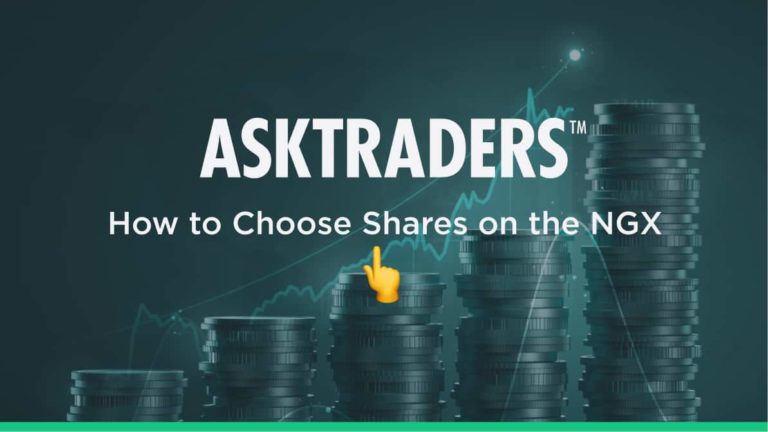
Why diversification is crucial for your portfolio
When you oversee your own investment portfolio, you have a responsibility to know the value of diversity.
You can hope that all your investments will appreciate, but the reality is that some of your assets may suffer losses from time to time.
To avoid having too much of your investing capital in the hands of too few companies or industries, diversifying your stock holdings is essential.

How to Choose Shares on the NGX
The Nigerian Exchange Group (NGX) is the country's official stock exchange. This implies that individual investors and traders may only trade the shares of publicly traded firms on the NGX.
Understanding the fundamentals of capital market investing is essential and considered the first step in reaching investment objectives.
Aside from the fundamentals, regardless of one's degree of expertise and market knowledge, it is impossible to trade well without analysis.
There are 156 listed shares on the floor of the Nigerian Exchange, and the truth is that no investor, institutional or retail, could be considered to have invested in all of them.
Even though technical indicators will provide short-term departure signals if there is a slump or tiny setbacks, you must stay invested in the stock if the firm is fundamentally sound.
To prevent short-term underperformance, you must be convinced that the stock will rise and provide strong returns in the future.
To make sure that Nigerians can choose the right shares for their investment portfolio, we discuss a few points for consideration when selecting shares.
Set Your Financial Goals
Anyone could participate in a stock market and take advantage of the possibilities it presents. In any case, the astute investor understands how to take advantage of such changes to achieve their own financial objectives.
You cannot know when to acquire or sell assets if you do not have a plan. If you want to succeed in the stock market, both in the short and long term, you need to plan out your strategy first.
Discover your Risk Appetite and consider your Capital
After creating an online trading and practice account, the next step is to determine how much money you can afford to invest and how much risk you are ready to face. Before you can go on to the stock-picking phase, you must have answers to these two factors.
Because the capital and risk parameters you establish for yourself will have a significant impact on what constitutes the “ideal stock” for you.
Evaluate the Quality of Management
When determining the potential return on a stock investment, knowing how competent the company's management is, is crucial.
It is expected of the leadership of a publicly listed firm that they possess the utmost attributes necessary to operate the business in the best interests of its shareholders. Stock buybacks and purchases by company insiders are also important indicators of value.
Insiders who purchase their own company's stock often have information that would make the investment worthwhile. When insiders acquire shares of stock consistently, it shows that management is prepared to back up their words with action.
An important indicator is the length of time management has held shares. There is a difference between investing for the long term and trading shares for a fast profit.
Consider the Quality of Earnings
The company's financial results should also be considered. Have the company's profits increased, or have they remained flat for an extended period for no apparent reason? Many investors' attention is only on previous or current results.
These are only snapshots of the state of the firm at a certain moment in time. Companies' future directions may be inferred by tracking their earnings momentum, or the rate of change in profits from one period to the next.
Find these trends by analysing earnings reports from the last eight quarters and analyst forecasts for the next quarters.
Carry out an Analysis of Key Metrics

View the Profit After Tax
The phrase “profit after tax” (PAT) refers to the amount of money left over after a company has paid its operating costs and tax obligations.
Earnings Per Share
Profit after taxes is divided by the total number of outstanding shares to get a company's earnings per share (EPS). The final tally may be used as a measure of a business's success. To put it simply, greater earnings per share indicates a more lucrative business.
Profit Margin
The profitability of a firm or an endeavour can be measured by looking at its profit margin. That figure indicates how much money was made, as a percentage, from sales.
Price/Earnings Ratio
Companies are valued using the price-to-earnings (P/E) ratio. The ratio of the current share price to EPS is used (EPS). The current share price divided by profits per share is a simple calculation.
To assess whether a company's stock is worth purchasing, investors and analysts often look at its price-to-earnings ratio (P/E). A company's performance can be measured against its past results using this method.
Earnings Yield
Divide the profits per share by the current market price and times that result by 100 to get the earnings yield. Profit yield is calculated by dividing the price per share by the profits per share. Earnings per share as a proportion of total business revenue.
Dividend Yield
The dividend yield measures the dividends paid out by a firm as a percentage of the stock price. In other words, it is determined by multiplying the dividend yield by the stock price.
Book Value
If a corporation were liquidated, its shareholders would get an amount equal to its Book Value, which is the difference between the firm's assets and liabilities.
Free Cash Flow
The term “free cash flow” (FCF) refers to a company's ability to generate profits after deducting operating expenses.
Return on Equity
The ratio of after-tax earnings to shareholders' equity is known as return on equity (ROE). Profitability and the efficiency with which a business generates profits may both be measured by the return on equity (ROE).
Return on Assets
How lucrative a business is compared to its total assets may be measured by looking at its return on assets (RAO).
Monitor Financial News
It could be quite helpful to keep up with the most recent developments in the financial and market news while you search for, manage, and adjust your assets.
Interviews, blogs, and publications that include the well-researched viewpoints of financial experts may be illuminating and aid in decision-making.
However, there is a possibility of speculation in this kind of reporting. So, to make sure you are heading in the right direction, you must do some frequent reading and keep updated with the news.
is dependent on the investments the broker has available. You should pay close attention to the commissions that are involved with the investments you like.
Overall Reliability
There is a diverse selection of brokers available. Several have been popular for many years, while others have just recently emerged.
That does not imply they cannot be trusted, but if they are managing transactions for clients, they are members of a self-regulatory organization like the Financial Industry Regulatory Authority (FINRA), the Financial Conduct Authority (FCA), and other regulators, or subject to additional oversight.
Account Fees
While it could be impossible to eliminate account fees, they may be kept to a minimum. To withdraw funds or investments, or to close your account, most brokers will assess a fee. When switching brokers, your new firm could pay some or all your transfer expenses.
If a broker does not charge them, or if you do not use their optional services, you could avoid paying most additional costs.
Annual costs, inactivity fees, trading platform subscriptions, and additional charges for research or data are all examples of the kind of expenses you should be aware of.
Pricing and Execution on Trades
Cost is less of a factor today, leading to commission-free transactions becoming the norm at most brokerages.
However, you should consider the brokerage's position on the controversial practice of paying for order flow and how much it costs before making a final decision.
This is especially true if you are an active trader who wants their deal completed at the best price possible, even if it means a difference of a few cents.
Additional Tools, Educational Materials, and Features
Look for a brokerage that provides free educational tools like live webinars, detailed how-to instructions, video tutorials, glossaries, and more if you are just starting in the investment world.
You should also look at the broker's commitment to educating its customers about the inherent hazards of more complex trading tactics like options.

Conclusion
Investors should be patient and cautious while selecting stocks for their portfolios. Determine what you value most in an investment, do your homework, and stick to the rules to improve your odds of success in the market.
You should also consider opening a trading and demo account with a reputable online FX and CFD share broker like those mentioned in this article.




